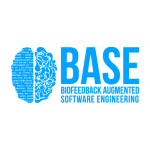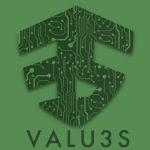
Software developers will use biometrics to warn them about potential mistakes and help them to build reliable software
The BASE project researches software (SW) faults, often known as defect or bugs, in a new interdisciplinary perspective putting together research teams of software reliability, neuroscience, physiological response to understand the brain mechanisms involved in SW error making/discovery and the corresponding autonomic manifestations that can be captured by wearable sensors, in order to identify conditions (and corresponding code lines) that may cause programmers making bugs or bugs escaping to human attention. The main breakthrough of BASE is a Biofeedback Augmented Software Engineering approach having programmers equipped with available wearable sensors (e.g., ECG, PPG, EDA,…) to monitor physiologic reactions to cognitive stress/concentration/attention shift states during code development. The accuracy and precision of wearable devices (expected to be noisy and including reactions to other stimuli) will be enhanced through correlation models derived from co-registration of fMRI/fNIRS/EEG/physiological sensors measurements, aimed at characterizing both the neural network associated to SW error making/discovery and the corresponding autonomic physiological manifestations. BASE will allow radically new features such as 1) online programmer/testers warning on code lines that may have bugs and need a second look, 2) guide the testing effort by taking into account bug prediction models enhanced with biofeedback data, and 3) create individual programmers? profiles that will help define adequate training needs.
FCT-PTDC/CCI-INF/31581/2017
Start date: 2018-07-26 End data: 2022-07-26
Project Coordinator
Project page

Formulate and validate a concept for “Separation Management” in the U-space, defining the basic blocks from which this service will be built and describing how they must be assembled and operated.
What does BUBBLES intend to do?
BUBBLES is a project targeting the formulation and validation of a concept of separation management for UAS (Unmanned Aircraft Systems) in the U-space. U-space is a set of new services relying on a high level of digitalisation and automation of functions and specific procedures designed to support safe, efficient and secure access to airspace for large numbers of drones.
This video shows a nice description of BUBBLES: https://www.youtube.com/watch?v=R7jpJ7lpekU
How are we going to get it?
BUBBLES will develop Artificial Intelligence (AI) based algorithms to compute the collision risk of UAS leading to separation minima and methods so that a Target Level of Safety (TLS) stated in terms of overall probability of collision can be defined and maintained.
These algorithms will be applied to a set of generic ConOps for UAS operations defined by BUBBLES, detailed enough to cover most of the envisaged applications, but generic enough not to be linked to any particular one. They will be classified in terms of risk using the SORA methodology.
These separation minima and methods will be assigned to the ConOps using AI techniques, leading to the definition of a set of generic OSEDs from which safety and performance requirements for the CNS systems will be derived applying a performance-based approach.
H2020-SESAR
Start date: 2020-06-01 End data: 2023-01-01
Coordinator of the University of Coimbra team
Project page

ADVANCE is aimed to conceive new approaches to support the Verification and Validation (V&V) of Cyber-Physical Systems (CPS)
The scientific objective of the ADVANCE project is to conceive new approaches to support the Verification and Validation (V&V) of Cyber-Physical Systems (CPS). It will explore techniques, methods, and tools applicable to different phases of the system lifecycle, but always with the final objective of improving the effectiveness and efficacy of the V&V process. In particular, ADVANCE will focus on two main aspects of V&V: i) techniques to collect V&V evidences for a CPS (focusing on system modeling, testing, fault forecast, and systematic processes like FMEA), and ii) techniques to manage and analyze data of the system under analysis (focusing on data analysis, requirements management, traceability). The strategic objective of the project is to build an international network of collaborations on the topic of V&V of CPSs. Besides allowing the consortium to reach the project’s scientific objectives, the established interactions would allow the training of students and professionals on the latest innovations in the V&V panorama, and have them work together towards a common goal. In fact, besides the technical challenges described above, an important factor hampering advancements in the V&V of CPSs is a worldwide lack of skilled professionals in V&V, software testing, and Information and Communication Technology (ICT) in general. One of the outputs of the project will be a set of training material, both in the form of slides and video courses, on the topic of Verification & Validation of Cyber-Physical Systems. These objectives will be pursued by joining together V&V experts having different specialization and different backgrounds, and establishing a targeted transfer of knowledge and collaboration program, using two real case studies as reference.
H2020-RISE
Start date: 2019-01-02 End data: 2022-12-30
Coordinator of the University of Coimbra team
Project page

VALU3S is aimed to develop new V&V methods and tools to reduce time and cost needed to verify and validate automated systems with respect to safety, cyber-security, and privacy requirements.
Manufacturers of automated systems and their components have been allocating an enormous amount of time and effort in R&D activities. This effort translates into an overhead on the V&V (verification and validation) process making it time-consuming and costly. The ECSEL JU project VALU3S aims to evaluate the state-of-the-art V&V methods and tools, and design a multi-domain framework to create a clear structure around the components and elements needed to conduct the V&V process. The main expected benefit of the framework is to reduce time and cost needed to verify and validate automated systems with respect to safety, cyber-security, and privacy requirements. This is done through identification and classification of evaluation methods, tools, environments and concepts for V&V of automated systems with respect to the mentioned requirements. To this end, VALU3S brings together a consortium with partners from 10 different countries, amounting to a mix of 25 industrial partners, 6 leading research institutes, and 10 universities to reach the project goal.
H2020-ECSEL
Start date: 2020-05-01 End data: 2023-04-30
Coordinator of the University of Coimbra team
Project page